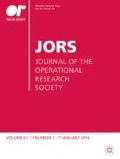Abstract
Experts (managers) may have domain-specific knowledge that is not included in a statistical model and that can improve short-run and long-run forecasts of SKU-level sales data. While one-step-ahead forecasts address the conditional mean of the variable, model-based forecasts for longer horizons have a tendency to convert to the unconditional mean of a time series variable. Analysing a large database concerning pharmaceutical sales forecasts for various products and adjusted by a range of experts, we examine whether the forecast horizon has an impact on what experts do and on how good they are once they adjust model-based forecasts. For this, we use regression-based methods and we obtain five innovative results. First, all horizons experience managerial intervention of forecasts. Second, the horizon that is most relevant to the managers shows greater overweighting of the expert adjustment. Third, for all horizons the expert adjusted forecasts have less accuracy than pure model-based forecasts, with distant horizons having the least deterioration. Fourth, when expert-adjusted forecasts are significantly better, they are best at those distant horizons. Fifth, when expert adjustment is down-weighted, expert forecast accuracy increases.
Similar content being viewed by others
Notes
This model is also used in Franses and Legerstee (2009) for the case h=1.
Fildes et al (2009) found that the parameter values could differ across positive and negative values of A. We postpone a detailed analysis of this issue to further work.
References
Blattberg RC and Hoch SJ (1990). Database models and managerial intuition: 50% model + 50% manager. Mngt Sci 36: 887–899.
Boulaksil Y and Franses PH (2009). Experts' stated behavior. Interfaces 39: 168–171.
Bunn DW and Salo AA (1996). Adjustment of forecasts with model consistent expectations. Int J Forecasting 12: 163–170.
Clark TE and McCracken MW (2001). Tests of equal forecast accuracy and encompassing for nested models. J Econometrics 105: 85–110.
Clark TE and McCracken MW (2005). Evaluating direct multi-step forecasts. Econometric Rev 24: 369–404.
Diamantopoulos A and Mathews BP (1989). Factors affecting the nature and effectiveness of subjective revision in sales forecasting: An empirical study. Manage Decis Econ 10: 51–59.
Fildes R and Goodwin P (2007). Good and bad judgement in forecasting: Lessons from four companies. Foresight 8: 5–10.
Fildes R, Nikolopoulos K and Crone SF (2008). Forecasting and operational research: A review. J Opl Res Soc 59: 1150–1172.
Fildes R, Goodwin P, Lawrence M and Nikolopoulos K (2009). Effective forecasting and judgemental adjustments: An empirical evaluation and strategies for improvement in supply-chain forecasting. Int J Forecasting 25: 3–23.
Franses PH and Legerstee R (2009). Properties of expert adjustments on model-based SKU-level forecasts. Int J Forecasting 25: 35–47.
Franses PH and Legerstee R (2010). Does experts' adjustment to model-based SKU-level forecasts improve forecast quality? J Forecasting 29: 331–340.
Goodwin P (2000). Improving the voluntary integration of statistical forecasts and judgement. Int J Forecasting 16: 85–99.
Mathews BP and Diamantopoulos A (1986). Managerial intervention in forecasting: An empirical investigation of forecast manipulation. Int J Res Mark 3: 3–10.
Nikolopoulos K, Fildes R, Goodwin P and Lawrence M (2005). On the accuracy of judgemental interventions on forecasting support systems. Lancaster University Management School Working paper 2005/022.
Sanders N and Manrodt KB (1994). Forecasting practices in US corporations: Survey results. Interfaces 24 (2): 92–100.
Syntetos AA, Boylan JE and Disney SM (2009a). Forecasting for inventory planning: A 50 year review. J Opl Res Soc 60: S149–S160.
Syntetos AA, Nikolopoulos K, Boylan JE, Fildes R and Goodwin P (2009b). The effects of integrating management judgement into intermittent demand forecasts. Int J Prod Econ 118: 72–81.
Acknowledgements
We thank the pharmaceutical company Organon BV (Oss, The Netherlands) for providing us with the data, and we thank two anonymous referees for their detailed comments.
Author information
Authors and Affiliations
Corresponding author
Appendix
Rights and permissions
About this article
Cite this article
Franses, P., Legerstee, R. Experts' adjustment to model-based SKU-level forecasts: does the forecast horizon matter?. J Oper Res Soc 62, 537–543 (2011). https://doi.org/10.1057/jors.2010.87
Received:
Accepted:
Published:
Issue Date:
DOI: https://doi.org/10.1057/jors.2010.87



